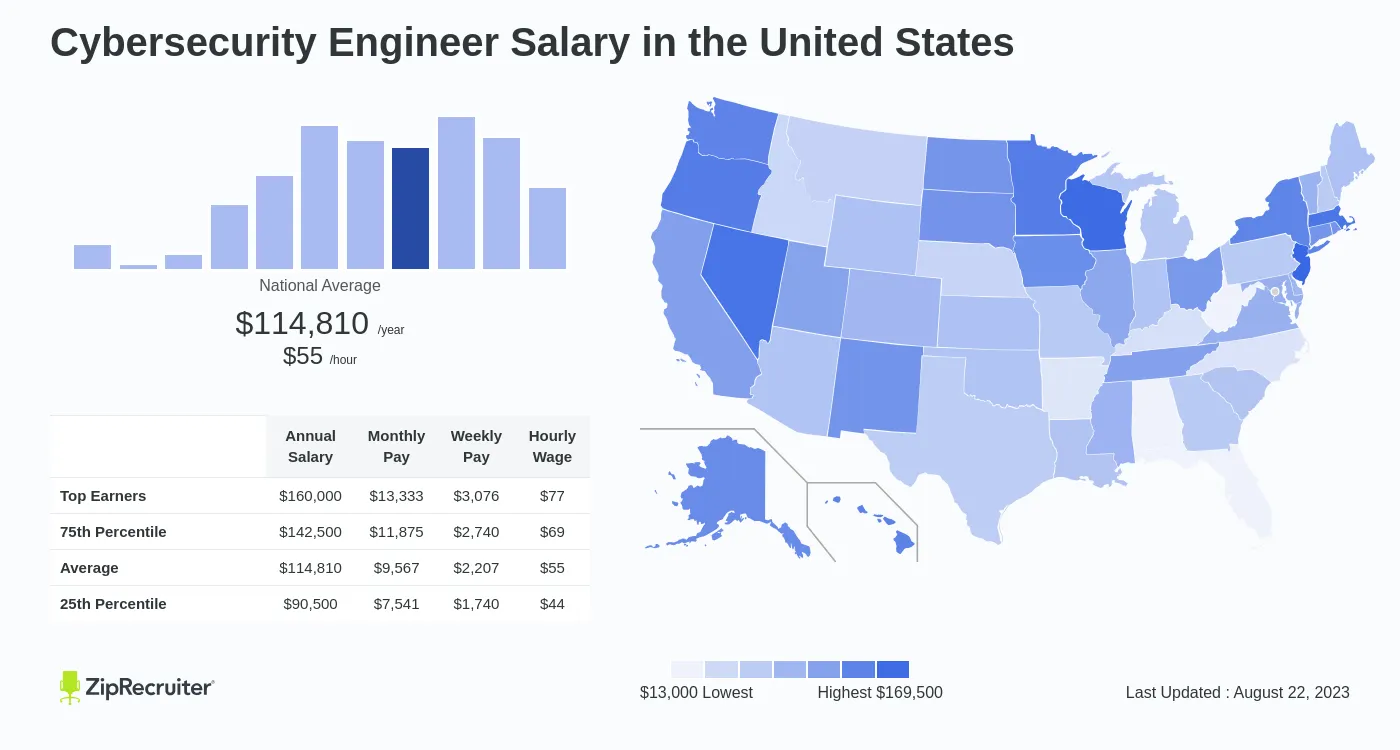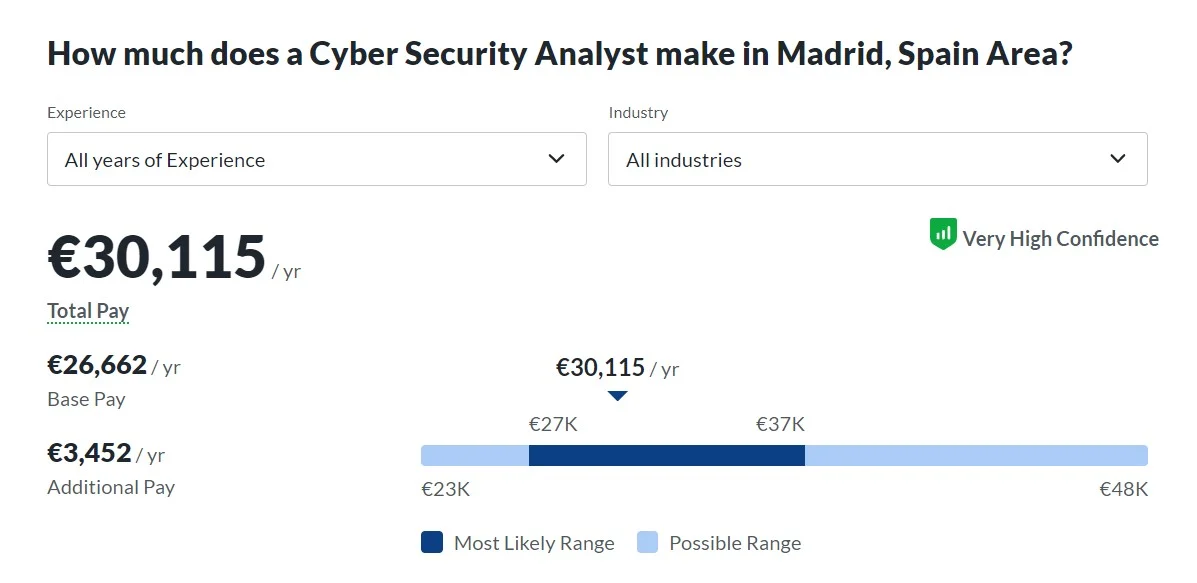Introduction
Welcome to the world of cybersecurity engineering, a field that plays a critical role in safeguarding our digital lives. In today’s increasingly interconnected world, cyber threats are on the rise, making cybersecurity more important than ever before. Cybersecurity engineers are the heroes who dedicate their skills and expertise to protecting our sensitive information from malicious attacks.
But what exactly is a cybersecurity engineer? In simple terms, they are professionals who design, implement, and maintain security measures to ensure the safety of computer systems, networks, and data. They analyze potential risks, develop strategies to mitigate them, and continually improve security protocols to stay one step ahead of hackers and cybercriminals.
The importance of cybersecurity engineers cannot be overstated, as they serve as the first line of defense against cyber threats. Their role is vital across a range of industries, including finance, healthcare, government, and technology. With the ever-evolving digital landscape, companies are realizing the urgency of investing in robust cybersecurity measures, leading to a growing demand for skilled cybersecurity engineers.
As with any profession, the salary of a cybersecurity engineer can vary depending on several factors such as industry, experience level, and location. In this article, we will explore the median salary range for cybersecurity engineers, dive into the factors that influence their pay, and provide insights on how to negotiate a higher salary in this competitive field.
What is a Cybersecurity Engineer?
A cybersecurity engineer is a professional responsible for protecting computer systems, networks, and data from unauthorized access, breaches, and attacks. They are essential in today’s digital landscape, where cyber threats pose a constant risk to our privacy and security.
These engineers possess a diverse skill set that combines technical knowledge, problem-solving abilities, and a deep understanding of the ever-evolving nature of cyber threats. They work diligently to anticipate and mitigate potential risks, develop robust security protocols, and respond quickly in the event of a breach.
At its core, the role of a cybersecurity engineer revolves around three primary responsibilities:
- Designing Security Measures: Cybersecurity engineers assess system vulnerabilities and develop strategies to protect against potential threats. They work closely with other IT professionals to implement appropriate security measures, including firewalls, encryption systems, identity and access management, and intrusion detection systems.
- Monitoring and Threat Analysis: These professionals continuously monitor network activity, analyzing logs and alerts to identify potential security breaches or suspicious activity. They utilize advanced tools and techniques to detect threats in real-time and respond promptly to mitigate any potential damage.
- Incident Response and Recovery: If a security incident occurs, cybersecurity engineers play a crucial role in investigating the breach, preserving evidence, and implementing remediation procedures. They work closely with incident response teams to contain the situation, restore system functionality, and prevent future incidents.
Cybersecurity engineers must stay up to date with the latest trends in technology and hacking techniques. They are constantly learning and expanding their knowledge to stay ahead of cybercriminals and ensure the highest level of protection for their organizations or clients.
Furthermore, effective communication and collaboration are essential skills for a cybersecurity engineer. They must be able to explain complex technical concepts to non-technical stakeholders, such as senior management or clients, and provide guidance on cybersecurity best practices to ensure organizational compliance and security.
Importance of Cybersecurity Engineers
In today’s digital age, the role of cybersecurity engineers has become increasingly vital. The constant growth of cyber threats and the increasing dependence on technology underline the crucial importance of these professionals in protecting our sensitive information. Here are some key reasons why cybersecurity engineers are so essential:
- Protection of Confidential Data: Cybersecurity engineers play a crucial role in safeguarding confidential information such as personal data, financial details, and intellectual property. They develop and implement robust security measures to prevent unauthorized access and ensure the privacy and integrity of sensitive data.
- Prevention of Financial Loss: Cyber attacks can result in significant financial losses for individuals and organizations. A breach can lead to reputational damage, legal liabilities, and loss of customer trust. Cybersecurity engineers help prevent such losses by fortifying systems, identifying vulnerabilities, and implementing measures to mitigate risks.
- Mitigation of Operational Disruptions: A successful cyber attack can disrupt business operations, leading to downtime, loss of productivity, and financial implications. Cybersecurity engineers work to minimize the impact of such disruptions by implementing effective incident response plans, recovering systems in a timely manner, and ensuring business continuity.
- Protection from Cyber Threats: With the ever-increasing sophistication of cyber threats, organizations need professionals who can stay one step ahead of hackers and cybercriminals. Cybersecurity engineers study and analyze evolving threats, implement proactive security measures, and continuously update defenses to prevent potential breaches.
- Compliance and Regulatory Requirements: Industries such as finance, healthcare, and government are subject to stringent cybersecurity regulations and compliance requirements. Cybersecurity engineers ensure that organizations adhere to these regulations and maintain a secure and compliant operating environment.
- Preservation of Trust: In a digital world where consumers entrust their personal information to organizations, maintaining trust is crucial. Cybersecurity engineers play a crucial role in building and preserving trust by protecting customer data and ensuring their private information remains secure.
In summary, cybersecurity engineers are the unsung heroes who undertake the critical task of protecting our digital infrastructure. By diligently fortifying security measures, mitigating risks, and staying ahead of cyber threats, they ensure the confidentiality, integrity, and availability of data, fostering a safer digital ecosystem for individuals and organizations alike.
Factors that Determine the Median Salary
The median salary of a cybersecurity engineer can vary depending on several factors. Understanding these factors can help professionals in the field better evaluate their earning potential and negotiate their salaries. Here are some key factors that influence the median salary of cybersecurity engineers:
- Level of Experience: One of the most significant factors affecting salary is the level of experience. As cybersecurity engineers gain more experience, their skills and expertise contribute to their value in the job market. Entry-level engineers may earn a lower salary compared to those with several years of experience and a proven track record.
- Education and Certifications: Higher educational qualifications such as a bachelor’s or master’s degree in cybersecurity, computer science, or a related field can have a positive impact on salary. Additionally, obtaining industry certifications, such as Certified Information Systems Security Professional (CISSP) or Certified Ethical Hacker (CEH), can further enhance earning potential.
- Industry and Organization: The industry in which a cybersecurity engineer works can significantly impact their salary. Sectors such as finance, healthcare, and technology tend to offer higher salary ranges due to the sensitive nature of the data they handle and the increased demand for cybersecurity expertise. Additionally, larger organizations often have more resources to offer competitive salaries.
- Location: The geographic location of the job can play a significant role in salary variations. Salaries tend to be higher in metropolitan areas and regions with a higher cost of living. For instance, cybersecurity engineers working in major cities like New York, San Francisco, or London might earn higher salaries compared to those working in smaller towns or rural areas with a lower cost of living.
- Job Responsibilities: The specific responsibilities assigned to a cybersecurity engineer can influence salary ranges. Positions that involve leading and managing teams, developing security strategies, or overseeing the implementation of large-scale projects may command higher salaries compared to roles focused solely on technical implementation.
- Demand and Supply: The supply and demand dynamics of the job market can impact salary levels. As the demand for skilled cybersecurity engineers continues to rise, there may be a shortage of qualified professionals, leading to higher salaries to attract and retain top talent.
It is important to note that these factors interact with each other and can vary from one individual to another. It is advised for cybersecurity professionals to consider these factors when evaluating salary offers, negotiating compensation packages, and planning their career growth.
Median Salary Ranges for Cybersecurity Engineers in Different Industries
The salary range for cybersecurity engineers can vary depending on the industry in which they work. Different sectors place varying levels of importance on cybersecurity, leading to differences in compensation. Here are some of the median salary ranges for cybersecurity engineers in different industries:
- Finance: The finance industry places a high emphasis on cybersecurity due to the sensitive nature of financial data. As a result, cybersecurity engineers in this sector can often command higher salaries. The median salary range for cybersecurity engineers in finance typically falls between $90,000 to $130,000 per year.
- Technology: The technology sector is at the forefront of digital innovation and faces significant cyber threats. Cybersecurity engineers in this industry have the opportunity to work on cutting-edge technologies and earn competitive salaries. The median salary range for cybersecurity engineers in the technology industry varies between $85,000 to $120,000 per year.
- Healthcare: With the increasing digitization of healthcare records and the need to protect patient privacy, the demand for cybersecurity professionals in the healthcare industry is on the rise. The median salary range for cybersecurity engineers in healthcare typically ranges from $80,000 to $110,000 per year.
- Government and Defense: Government agencies and defense organizations have a critical need for strong cybersecurity measures to protect national security. Cybersecurity engineers in this sector often enjoy attractive salary ranges due to the high level of responsibility and specialization required. The median salary range for cybersecurity engineers in government and defense is typically between $90,000 to $130,000 per year.
- Consulting: Many cybersecurity professionals choose to work in consulting firms, providing services to various industries. The median salary range for cybersecurity engineers in consulting can range from $80,000 to $120,000 per year, with the potential for higher earnings based on experience and expertise.
It is important to note that these salary ranges are averages and can vary based on factors such as location, experience level, and the size of the organization. Factors such as cost of living, the demand for cybersecurity talent, and competition for skilled professionals can also influence salary ranges within specific industries.
As the importance of cybersecurity continues to grow across industries, so too will the demand for skilled professionals. This demand may lead to an increase in salaries and additional benefits to attract and retain top talent in the field.
Median Salary Ranges for Cybersecurity Engineers by Experience Level
The level of experience plays a significant role in determining the salary range for cybersecurity engineers. As professionals gain more experience and expertise in the field, their earning potential tends to increase. Here are the median salary ranges for cybersecurity engineers based on experience level:
- Entry-Level: Entry-level cybersecurity engineers typically have little to no professional experience in the field. The median salary range for entry-level positions generally falls between $60,000 to $80,000 per year. It is important to note that these figures can vary depending on factors such as education, certifications, and the demand for cybersecurity professionals in a particular area.
- Mid-Level: Mid-level cybersecurity engineers have gained a few years of experience and have proven their capabilities in the field. The median salary range for mid-level positions typically ranges from $80,000 to $110,000 per year. Professionals at this level often have a solid foundation of skills and have started to specialize in specific areas of cybersecurity.
- Senior-Level: Senior-level cybersecurity engineers possess extensive experience and expertise in the field. They have demonstrated leadership capabilities and are often responsible for overseeing complex cybersecurity projects and managing teams. The median salary range for senior-level positions can range anywhere from $110,000 to $150,000 per year, or even higher in some cases. These professionals often have a deep understanding of the industry, hold advanced certifications, and have a track record of successful implementations.
It’s important to note that these salary ranges are approximations and can vary based on factors such as location, industry, the size of the organization, and the demand for cybersecurity professionals. Additionally, professionals who have earned advanced degrees or specialized certifications may earn salaries higher than the ranges mentioned above.
As in any field, experience is a valuable asset in the cybersecurity industry. With each level of experience, cybersecurity engineers gain a deeper understanding of the field, acquire advanced skills, and take on more responsibilities. This increased expertise and impact on organizational security contribute to the higher salary ranges for professionals with more years of experience.
Average Salary vs Median Salary: What’s the Difference?
When analyzing salary data, it’s important to understand the difference between average salary and median salary. While these two terms are often used interchangeably, they represent different calculations that provide different insights into salary distributions. Here’s a breakdown of what each term means:
Average Salary: The average salary, also known as the mean salary, is calculated by taking the sum of all salaries in a given dataset and dividing it by the total number of individuals included in that dataset. It is computed by adding up all the salaries and then dividing the total by the number of data points. The average salary can be affected by extreme outliers, meaning that a few exceptionally high or low salaries could significantly impact the overall average.
Median Salary: The median salary, on the other hand, represents the midpoint in a distribution of salaries. It is the middle value in a dataset when it is arranged in ascending or descending order. To calculate the median salary, salaries are arranged from lowest to highest, and the one that falls exactly in the middle is selected. Unlike the average salary, the median is not influenced by extreme outliers and provides a better representation of the typical salary in a given dataset.
So, what does this mean for determining the salary range for cybersecurity engineers? When discussing salary ranges, it is often more reliable to use the median salary. This is because the median is less affected by extreme outliers and provides a better representation of the typical salary for cybersecurity engineers across various levels of experience and industries.
However, it’s worth noting that both average and median salaries have their merits in different contexts. The average salary provides a comprehensive view of the overall salary distribution, while the median salary offers a more reliable measure of the midpoint in that distribution.
Ultimately, it is important to consider both average and median salaries when analyzing salary data. While the median salary provides a better representation of the typical salary, the average salary can offer additional insights when looking at the salary range as a whole.
How to Negotiate a Higher Salary as a Cybersecurity Engineer
Negotiating a higher salary is an essential skill for any professional, including cybersecurity engineers. Here are some strategies to consider when negotiating your salary:
- Research Salary Data: Before entering into salary negotiations, gather information about the average and median salaries for cybersecurity engineers in your industry and location. This will provide you with a benchmark to assess and justify your salary expectations.
- Highlight Your Skills and Experience: Emphasize your unique skills, experience, and accomplishments during the negotiation process. Showcase how your expertise can bring value to the organization and help address their cybersecurity needs effectively.
- Quantify Your Contributions: In your discussions, provide concrete examples of how you have made a positive impact in previous roles. Highlight specific projects or initiatives where you played a key role in enhancing security, reducing risks, or improving overall cybersecurity posture.
- Emphasize Industry Certifications: Certifications such as Certified Information Systems Security Professional (CISSP) or Certified Ethical Hacker (CEH) demonstrate your commitment to professional development and can strengthen your negotiation position. Highlight any certifications you hold and their relevance to the organization’s cybersecurity objectives.
- Consider Additional Benefits: Compensation negotiations can extend beyond base salary. Evaluate the organization’s overall benefits package, including healthcare, retirement plans, flexible work arrangements, professional development opportunities, and bonuses. These additional perks can contribute to your overall compensation package.
- Timing is Key: Choose the right time to initiate salary discussions. Starting the conversation during performance reviews, contract renewals, or when taking on additional responsibilities can increase your chances of success.
- Practice Effective Communication: Clearly articulate your value proposition, and be confident and persuasive in your discussions. Use specific examples and metrics to back up your arguments and demonstrate the impact of your work.
- Be Flexible: While it’s important to advocate for a higher salary, be open to negotiation and consider other aspects of the job offer. Flexibility can help create a mutually beneficial agreement that satisfies both your financial goals and the organization’s budget constraints.
- Consider Long-Term Growth: Discuss opportunities for professional growth, such as career advancement, training, or mentorship programs. Demonstrating your commitment to ongoing development can contribute to your negotiation and highlight your dedication to continuous improvement in the field of cybersecurity.
Remember, negotiation is a two-way process. It’s essential to approach discussions with a mindset of collaboration and find a balance that meets both your salary expectations and the organization’s needs. With careful preparation, effective communication, and a focus on mutual benefit, you can increase your chances of negotiating a higher salary as a cybersecurity engineer.
Conclusion
Cybersecurity engineering is an essential field in today’s digital landscape. The role played by cybersecurity engineers in protecting our digital infrastructure, sensitive information, and privacy cannot be overstated. As the demand for skilled cybersecurity professionals continues to rise, understanding key factors influencing salary ranges and negotiation strategies becomes crucial.
In this article, we have explored various aspects related to the median salary of cybersecurity engineers. We discussed what cybersecurity engineers do, their importance in safeguarding our digital lives, and the factors that influence their salary ranges. We also examined median salary ranges in different industries and the impact of experience level on earnings.
Furthermore, we differentiated between average salary and median salary, highlighting the importance of taking both into account when analyzing salary data. Lastly, we provided tips on how to negotiate a higher salary as a cybersecurity engineer, emphasizing the value of research, skills, certifications, and effective communication during the negotiation process.
As the field of cybersecurity continues to evolve and the demand for skilled professionals increases, it is essential for cybersecurity engineers to stay updated with industry trends, enhance their skills, and actively seek out opportunities for professional growth. By doing so, they can not only command higher salaries but also contribute effectively to the security and integrity of digital systems.
Remember, salary negotiation is an ongoing process. It is crucial to regularly reassess your value, monitor industry trends, and continuously engage in professional development to ensure you are well-positioned to negotiate competitive compensation packages throughout your cybersecurity career.
By leveraging your skills, expertise, and the knowledge gained from this article, you can confidently navigate salary negotiations and strive for the compensation you deserve as a cybersecurity engineer.

























